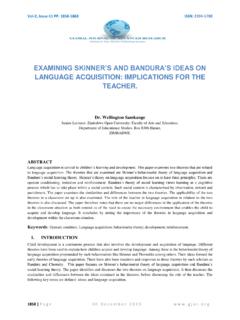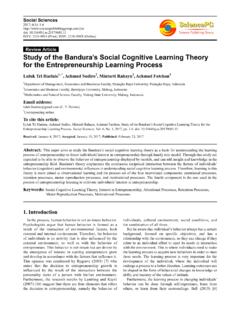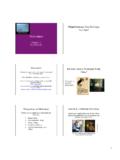Transcription of Bandura's Social Learning Theory & Social Cognitive ...
1 See discussions, stats, and author profiles for this publication at: 's Social Learning Theory & Social Cognitive Learning TheoryArticle January 2012 CITATIONS30 READS502,3281 author:Some of the authors of this publication are also working on these related projects:Life Satisfaction View projectRazieh Tadayon NabaviUniversity of Science and Culture15 PUBLICATIONS 36 CITATIONS SEE PROFILEAll content following this page was uploaded by Razieh Tadayon Nabavi on 04 November user has requested enhancement of the downloaded of Developmental Psychology Title: bandura s Social Learning Theory & Social Cognitive Learning Theory Razieh Tadayon Nabavi 2011-2012 2 Table of content Father of the Cognitive 3 Introduction .. 3 Social Learning Theory (SLT) .. 5 General principles of SLT .. 6 Behaviors learned through modeling .. 7 SLT Concepts .. 8 Observational Learning .. 8 Intrinsic 9 Modeling Process.
2 9 SLT perspectives .. 10 Social Cognitive Learning Theory (SCLT) .. 11 Basic Assumptions of SCLT .. 11 Cognitive Features on 13 Phenomena of SCLT .. 13 Internal principle of SCLT .. 14 Self-efficacy and SCLT .. 15 Self-regulation and SCLT .. 17 The Linking between SLT and SCLT .. 18 Strengths and Weaknesses of SLT .. 18 Strengths of SCLT .. 19 Limitations of SCLT .. 19 20 References .. 22 3 Father of the Cognitive Theory Albert bandura is known as the father of Cognitive Theory . He was born December 4, 1925 in a small town in northern Alberta, Canada, located approximately 50 miles from Edmonton. bandura s early education consisted of one small school with only two teachers. (Stokes, 1986). Albert bandura soon became fascinated by psychology after enrolling at the University of British Columbia. He had started out at biological sciences major, his interest in psychology formed quite by accident.
3 He was working nights and commuting to school with a group of students who arrived much earlier than his other courses started. ( Pajares, 2004). In 1949 he graduated from the University of British Columbia with a degree in Psychology. He received his in Clinical Psychology from the University of Iowa in 1952. After he finished his PhD because of his famous studies and searches bandura was elected as the president of the American Psychological Association in 1974. He was also elected as the outstanding lifetime contribution to Psychology, American Psychological Association in 2004. Among all scholars bandura was known as the father of the Cognitive Theory . ( bandura , 2006a). Introduction Based on previous studies, Learning is defined as A persisting change in human performance or performance potential as a result of the learner s interaction with the environment (Driscoll, 1994, pp.)
4 8-9). Learning is also elucidated by Weinstein & 4 Mayer (1986) as The relatively permanent change in a person s knowledge or behavior due to experience (p. 1040). On this point, Shuell (1986) clarified Learning as An enduring change in behavior, or in the capacity to behave in a given fashion, which results from practice or other forms of experience ( p. 412). Learning theories see the environment as the major force in development. (Hoffman, 1993). Scholars categorized Learning theories as Behaviorism, Social Learning Theory (SLT) and Social Cognitive Learning Theory (SCLT). In the context of study, Albert bandura is arguably the most eminent living psychologist. His Social Cognitive Theory has influenced many areas of inquiry: education, health sciences, Social policy and psychotherapy among others. (See figure 1) SLT & SCLT are based on ObservationSLTSCLTvia observation, imitation, and modelingvia observation understanding, predicting and changing human behavior.
5 Figure 1 Process of SLT and SCLT based on observation 5 Social Learning Theory (SLT) Social Learning Theory is increasingly cited as an essential component of sustainable natural resource management and the promotion of desirable behavioural change. (Muro & Jeffrey 2008). This Theory is based on the idea that we learn from our interactions with others in a Social context. Separately, by observing the behaviors of others, people develop similar behaviors. After observing the behavior of others, people assimilate and imitate that behavior, especially if their observational experiences are positive ones or include rewards related to the observed behavior. According to bandura , imitation involves the actual reproduction of observed motor activities. ( bandura 1977). SLT has become perhaps the most influential Theory of Learning and development. It is rooted in many of the basic concepts of traditional Learning Theory .
6 This Theory has often been called a bridge between behaviorist Learning theories and Cognitive Learning theories because it encompasses attention, memory, and motivation. (Muro & Jeffrey 2008). However, on this regards, bandura believes that direct reinforcement could not account for all types of Learning . For that reason, in his Theory he added a Social element, arguing that people can learn new information and behaviors by watching other people. According to the elements of this Theory there are three general principles for Learning from each other. 6 General principles of SLT The principles of Social Learning are assumed to operate in the same way throughout life. Observational Learning may take place at any age. Insofar as exposure to new influential, powerful models who control resources may occur at life stage, new Learning through the modeling process is always possible.
7 (Newman & , 2007). SLT posits that people learn from one another, via: Observation; Imitation; and Modeling Based on these general principles, Learning can occur without a change in behavior. In other words, behaviorists say that Learning has to be represented by a permanent change in behavior; while in contrast Social Learning theorists say that because people can learn through observation alone, their Learning may not necessarily be shown in their performance. ( bandura , 1965). Learning may or may not result in a behavior change. ( bandura , 2006b). bandura demonstrated that cognition plays a role in Learning and Over the last 30 years Social Learning Theory has become increasingly Cognitive in its interpretation of human Learning ; these points supported by (Newman & , 2007). 7 Behaviors learned through modeling The people who are being observed are called models and the process of Learning is called modeling.
8 This point supported by (Newman & , 2007). bandura s stated second and third stages of Social Learning , imitation and behavior modeling, will occur if a person observes positive, desired outcomes in the first stage. If, for example, an instructor attends and observes a course in-world and is entertained, informed, and approves of the way students act, they are more likely to want to teach a course in-world themselves. They can then use the behavior they experienced to imitate and model other instructors teaching styles in-world ( bandura , 1986) Previous studies confirmed that at least partly of many behaviors can be learned through modeling. Some examples that can be cited on this regards are, students can watch parents read, students can watch the demonstrations of mathematics problems, or seen someone acting bravely and a fearful situation ( bandura , 2006a).
9 Based on this point, aggression can also be learned through models. Much research indicates that children become more aggressive when they observed aggressive or violent models. From this view, moral thinking and moral behavior are influenced by observation and modeling. In consequence, learing includes moral judgments regarding right and wrong which can in part, develop through modeling. 8 SLT Concepts Based on the literature, there are three concepts in SLT. Firstly, people can learn through observation which is known as observational Learning . Secondly, mental states are important factor for Learning it is also named as intrinsic reinforcement. Finally, it refers to this point that Learning does not necessarily lead to a change in behavior and it follows by modeling process. Observational Learning In 1961 bandura conducted his famous experiment known as the Bobo doll experiment, to study patterns of behavior, at least in part, by Social Learning Theory , and that similar behaviors were learned by individuals shaping their own behavior after the actions of models.
10 Bandura's results from the Bobo Doll Experiment changed the course of modern psychology, and were widely credited for helping shift the focus in academic psychology from pure behaviorism to Cognitive . The experiment is among the most lauded and celebrated of psychological experiments. (Newman & , 2007). The study was significant because it departed from behaviorism s insistence that all behavior is directed by reinforcement or rewards. The children received no encouragement or incentives to beat up the doll; they were simply imitating the behavior they had observed. bandura termed this phenomena observational Learning and characterized the elements of effective observational Learning as attention, retention, reciprocation and motivation. He demonstrated that children learn and imitate behaviors which they have observed in other people. On this process, he identified three basic models of observational Learning : 9 A live model, which involves an actual individual demonstrating or acting out a behavior.


